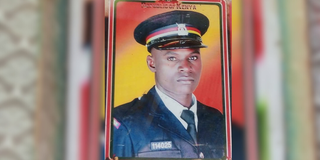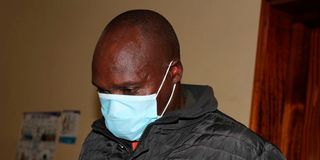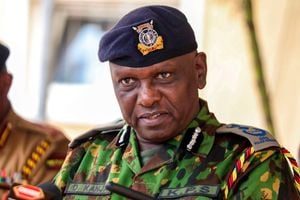
A January 2022 police report found that at least 12,000 of 110,000 officers had mental health problems. (Inset from left) Corporal Caroline Kangogo, Police Constable David Okebe Goga (both deceased) and Constable Jackson Konga.
On April 6, Police Constable David Okebe Goga, attached to Marsabit Police Station, poisoned three children — including two of his own and his nephew — before taking his own life in a tragic incident that left Kagoga Village in Rachuonyo North, Homa Bay County, reeling in shock.
Four years ago, on January 4, 2021, a police officer in Garissa shot and killed himself just hours after a prison warder in Mwea in Kirinyaga County died by suicide after murdering a colleague in an alleged love triangle.

Officer David Okebe Goga.
The two incidents came a day after a murder-suicide at Kamukunji Police Station in Nairobi, where an officer killed his female colleague, injured another and then turned the gun on himself.
Such grim episodes are becoming more frequent, spotlighting growing mental health challenges within the police service.
Increasing cases of suicide and attacks by officers on their colleagues and family members have further raised concerns about the psychological well-being of officers in uniform.
Yet even as the crisis escalates, the National Police Service Commission’s (NPSC) ability to respond with timely counselling support appears overstretched and inadequate.
Appearing before the National Assembly’s Committee on Cohesion and Equal Opportunities last week, NPSC Chief Executive Officer Peter Leley admitted that existing counselling services cannot cope with the rising demand.

National Police Service Commission Chief Executive Officer Peter Leley.
“There is need for recruitment of additional counsellors, social workers, and technical staff to be posted to the regions to provide counselling services,” Mr Leley told the committee.
The commission currently runs only eight regional counselling centres across the country, leaving vast and volatile regions such as Turkana, Samburu, Baringo and West Pokot without accessible mental health services.
These centres are based in Embu and Machakos (Eastern), Lamu and Mombasa (Coast), Kisumu (Nyanza), Nakuru and Eldoret (Rift Valley), Nyeri and Kiambu (Central), Mandera and Marsabit (North Eastern), Kakamega (Western) and several units in Nairobi such as the GSU Headquarters and DCI Academy.
In his submissions to the committee, the CEO explained that during the 2021/2022 and 2022/2023 financial years, the NPSC deployed 38 counsellors and social workers to 12 counselling centres.
However, according to Mr Leley, the demand for psychological support far exceeds the capacity of these personnel.
To enhance efficiency and support, the commission has also set up five regional offices in Mombasa, Garissa, Kakamega, Kisumu and Nairobi, with plans to establish five by 2027.
Members of Parliament have also raised concerns over the few counselling centres available.
“The eight regional counselling centres are not sufficient to provide psychological support to police officers. We want the National Police Service Commission (NPSC) to enhance counselling services to police officers to save them from untimely death resulting from stress and other psychological issues. The current regional centres are not adequate,” said the committee chairman who is also Mandera West MP Adan Yusuf Haji.
MPs also decried the distances officers must travel to access help.
For instance, officers stationed in bandit-prone areas of Samburu, Turkana and Baringo must seek support in Eldoret or Nakuru, which are hours away from their posts.
Luanda MP Dickson Maungu, whose constituency is served by the Kakamega centre, noted that even though it is far for some officers.
“It’s tough for an officer from my rural home in Luanda to travel many kilometres for counselling. We want such services brought closer, even at the police station level,” he said.
The committee also learned that the commission is reviewing the police training curriculum to include mental health awareness and is developing a memorandum of understanding with hospitals to provide rehabilitation and counselling services.
A growing body of research underscores the urgent need for such interventions. Globally, more law enforcement officers die by suicide than are killed in the line of duty.
A recent study by the Addiction Centre in the US found that police officers are at higher risk of suicide than those in any other profession.
In Kenya, this trend is tragically evident.
On August 8, 2023, a police officer attached to the Rift Valley Regional K-9 Unit in Nakuru shot and killed his supervisor after an argument.
Constable Jackson Konga ambushed and shot Sergeant Christopher Kimeli in the back, killing him instantly.

Police Constable Jackson Konga at a Nakuru court on August 9, 2023 where he was arraigned over the murder of his boss Sergeant Christopher Kimeli on August 8, 2023 at the Rift Valley Regional K-9-unit headquarters.
Two years earlier, in August 2021, another officer based at Njoro Police Station killed his girlfriend, who had been hospitalised following an assault and later turned the gun on himself.
Days later, an officer from Olenguruone collapsed and died after visiting his girlfriend.
In June 2021, Corporal Caroline Kangogo was found dead at her parents’ home in Elgeyo-Marakwet County days after allegedly killing fellow officer John Ogweno and businessman Peter Ndwiga in separate incidents.

Corporal Caroline Kangogo, who was found dead in Iten, Elgeyo-Marakwet County on July 16, 2021.
Her body was discovered in a bathroom, with a gun beside her.
A year later, in July 2022, an officer attached to Buruburu Police Station took his own life at the station’s canteen after reportedly struggling with depression since losing his firstborn son in 2019.
Harrison Mwangi, 42, had also been facing disciplinary hearings by the NPS.
According to mental health expert Dr Reuben Osiemo, prolonged exposure to traumatic events such as violent crime scenes, coupled with high workloads and poor work-life balance, leaves many police officers vulnerable to mental illness.
“Police officers are usually the first at crime scenes, including gruesome ones. The constant exposure can trigger PTSD and depression. Many also work long shifts, which increases anxiety, hopelessness and eventually depression,” said Dr Osiemo.
In response, the National Police Service has taken steps to review its internal policies, including promotions, transfers and disciplinary procedures, which for long have been considered stress triggers and are under revision.
A special medical board has also been established in collaboration with the Ministry of Health to assess and support officers with mental illness or injuries sustained on duty.
In addition, the NPS has created a Directorate of Chaplaincy and Counselling to coordinate spiritual and psychological support.
However, lawmakers insist more needs to be done and quickly.
“The country is losing too many officers to suicide and violence. Police are heroes who risk their lives to protect us. We cannot sit by and watch them kill themselves or their colleagues,” said MP Maungu.








